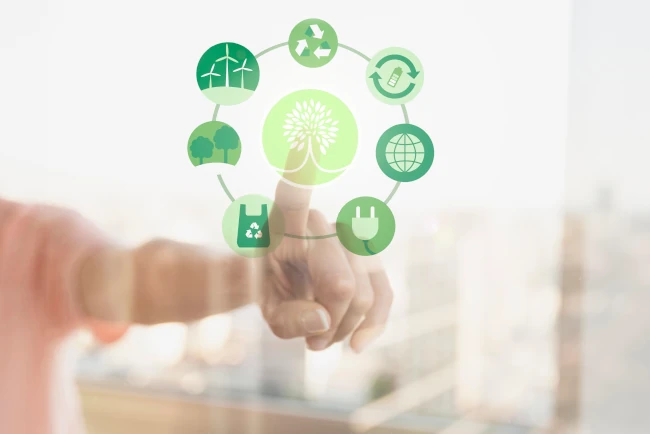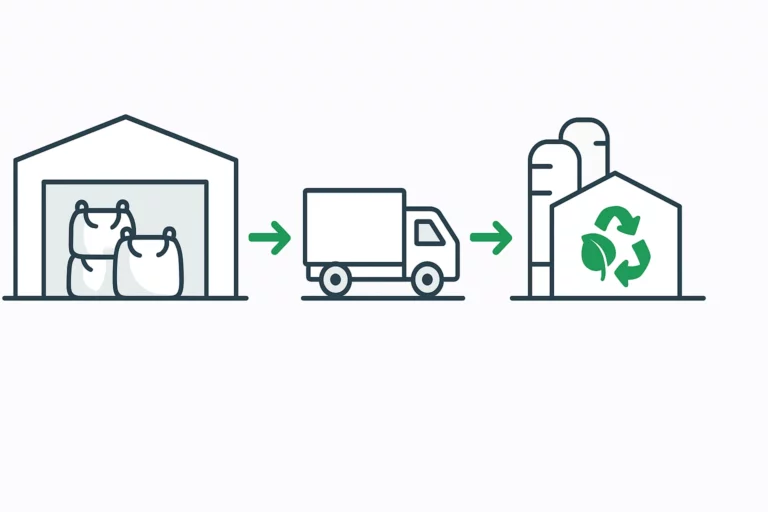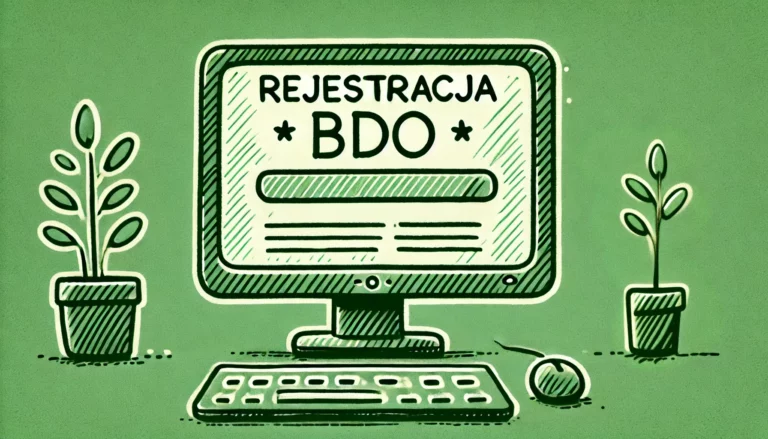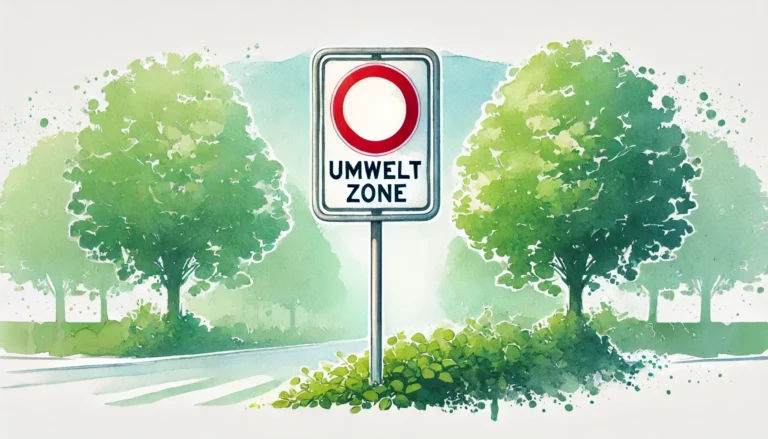Textile recycling and BDO: everything you need to know

Textile waste is one of the largest and fastest growing waste streams in Europe today. More and more clothes are ending up in landfills as production has accelerated and the 'fast fashion' culture dominates the market. Meanwhile, only one third of clothing is recycled, with the rest going to landfill or incineration. This has negative consequences for both the environment and companies: rising disposal costs and increased legal liability risks. Therefore, a broad and efficient approach to textile waste management is necessary today.
Need help organising your textile waste collection?
Textile recycling and BDO - waste producer responsibilities
If you are a generator of textile waste - for example, you own a clothing brand, run a processing plant or produce technical products - you must fulfil the following obligations:
- Selective collection and classification of waste.
Every manufacturer should ensure that collect textile waste separately. Different types of them - clothing, curtains, industrial textiles - require separate classification. This is not only an obligation under EU legislation, but also a condition for the efficient processing of materials. - Documenting operations in the BDO system.
The waste generator must have an account in the BDO system and generate a KPO (Waste Transfer Note) each time the waste is collected by a transport company. This document provides full transparency of the waste flow. - Assessment of cleanliness and preparation for dispatch.
Clean and segregated textiles have a much better chance of being successfully recycled. As a manufacturer, you should pay attention to ensure that the waste you produce does not contain contaminants such as metals, chemicals or plastic components.
Textile recycling - BDO obligations for carriers
Entry in the register
Transport companies have a vital function in the entire waste management chain. Their activities are not just limited to the physical movement of cargo - they also involve a number of formal and operational requirements. First and foremost, every waste transporter must have an active registration in the BDO register under section VII. It is worth emphasising that this is no longer a matter of a decision by the district governor (this one expired in 2018 after the launch of the aforementioned system) - the absence of an up-to-date entry means that there is no legal basis for carrying out the transport and may result in the imposition of severe sanctions and the invalidation of the entire transport operation.
Proper record keeping
A key obligation of the carrier is also proper preparation of the dossier. Before the transport begins, he must validate the Waste Transfer Note (WTP) and ensure that all the data it contains is correct and factually correct. Any discrepancies - for example in the waste code or weight - must be reported immediately so that corrections can be made before the transport. It is therefore a good idea to ensure that drivers are properly trained - they should know what they are transporting and how to document the transport in a way that complies with current legislation.
Control
Quality control of the load before loading is also an important step. Textile waste must be dry, free of contamination and properly labelled. It is unacceptable to transport materials that are soggy, contaminated with foreign bodies or without identification labels. Adequate protection of the waste during transport is crucial not only from an environmental point of view, but also to preserve the value of the material - e.g. by protecting it from moisture, which can completely prevent further recycling.
Textile recycling and BDO - Recipient expectations
The role of recyclers in the journey of waste towards a second life is crucial and requires both professionalism and a high degree of responsibility. First and foremost, any recycler of textile waste must have an appropriate permit - issued by the provincial governor or other authorised authority. Such a document usually specifies exactly what types of waste can be accepted and what processes can be used on it. Equally important is an entry in the BDO register, covering the scope of textile recovery and recycling. Without such an entry, the recycler is not in a position to issue documents confirming the treatment of the waste. This in turn exposes all participants in the chain to administrative sanctions.
In practice, this also means that recyclers must only accept material that conforms to the documentation and declared condition. If the waste is heavily contaminated or does not correspond to the KPO declarations, the trader may refuse to accept it. This can result in delays and additional costs. Reliable record-keeping is also an indispensable part of the recycler's business. Every tonne of waste must be recorded in a way that allows the entire process to be traced, and this data must be available in the event of an inspection by supervisory authorities.
Benefits of the right approach
The proper management of textile waste brings tangible benefits for the environment, businesses and the recycling industry. On an ecological scale, this means above all a reduction in the amount of waste sent to landfill. In turn, this entails a reduction in CO₂ emissions and a reduction in the consumption of primary raw materials. Thanks to less incineration, fewer toxic substances are also released into the atmosphere. This translates into a real improvement in air quality and public health.
For companies that implement responsible practices in this area, there are also concrete business benefits. First and foremost, a reduction in the legal risk associated with incorrect documentation or improper waste transfer. A not insignificant improvement in image in the eyes of customers, contractors and control institutions is also important. Well-prepared textile waste can regain its market value if it goes to a certified recycler - an opportunity to minimise losses and even generate revenue.
For the recyclers themselves, on the other hand, an orderly collection and transport system means access to more valuable raw material. Clean, segregated textiles are easier to sort and process. This affects the efficiency of the entire process and increases the return on investment in recycling infrastructure.
An effective textile recycling chain
Imagine a clothing company planning a winter collection recall. It contracts with a certified recycler and transport company:
- Any party involved in the movement must have up-to-date permits. Without them, the operation may be considered illegal.
- The waste is washed, sorted according to fabric type and packed in labelled containers. Such segregation significantly facilitates further processing.
- A KPO is then generated with the quantity, waste code, carrier and recycler data. All data must be consistent and complete.
- Based on this, the driver delivers the load to the recycler, who confirms receipt, verifies the weight and technical condition of the waste.
- Finally, each party receives a copy of the acknowledgement, which it must keep for five years.
In a previous publication, "Textile transport - when does clothing become waste?", we also address the issue of when they can lose their waste status and be fit for re-sale. Failure to properly acknowledge this in documents has caused problems for many of our customers. It is therefore worth emphasising once again how important it is to prepare the documentation properly.
Textile recycling is a challenge - you don't have to be alone with it
Effective textile management is not only a matter of compliance, but also a competitive advantage. Transparency in documentation, good communication between actors in the chain and attention to the quality of the waste avoid problems and profit from the value of the material.
Ecologistics24 offers full support. We will organise transport with a reliable haulier, verify the documentation and ensure that we only work with proven recyclers. In this way, we will guarantee the efficient management of your waste.
Interested? Contact us today and put your company's textiles in order once and for all.






